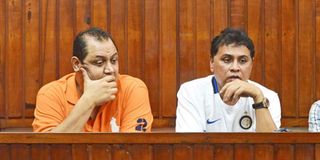Freedom for Akasha's guarantors: Court orders release of sureties

Baktash Akasha Abdalla (left) and Vijaygiri Goswami during the hearing of their extradition case in 2016. Kenyans who stood surety for the sons of slain drug baron Ibrahim Akasha are fighting in court to recover property worth millions of shillings used in the transaction.
Kenyans who acted as sureties for the sons of slain drug lord Baron Ibrahim Akasha have reason to rejoice after a Mombasa court ordered that the title deed to property worth millions of shillings deposited in court be released to them.
The ruling is a relief for Adil Nazf Daud, Nurdin Akasha Abdalla, and Rayan Mohamed Abdalla, whose title deeds have been lying in court for more than seven years.
It has been a difficult battle for trio to have the vital documents returned to them.
Chief Magistrate Martha Mutuku agreed with the three that they are no longer bound by their duties and that the court will continue to hold the land documents in vain.
"In conclusion, and in the interest of justice, this court finds that the applicants' application has merit and is thus allowed," the magistrate said.
The magistrate also declared that Daud, Nurdin, and Mohamed had been unconditionally relieved of their surety duties and ordered that the titles to property known as land reference number 21078 (L.R. No. 130577, L.R. No. 5975 (original no.5679/3) and title No. CR.19129 (original no.1710/6 respectively) be released to them.
"This court hereby orders that Daud, Nurdin, and Mohamed be relieved unconditionally of their duties as sureties in Miscellaneous Criminal Case No. 356 of 2014 filed at the Chief Magistrate's Court in Mombasa," the magistrate said.
The three stood surety for Ibrahim Akasha, Baktash Akasha and Vijaygiri Anandgiri Goswami.
Ibrahim, Baktash, and Goswami were facing extradition proceedings in Mombasa at the time. The surety provided them with temporary freedom while they fought the extradition proceedings, which ultimately went against their wishes.
The applicants informed the court that Kenyan laws allow for the discharge of sureties when it is no longer practical or beneficial to the state to require a citizen to continue acting as a surety for an accused person.
They also stated that because they have fully discharged their individual duties as sureties, they no longer wish to have their properties held as surety for individuals whose attendance in court in Kenya is impractical due to their residence in another jurisdiction.
"Our legal duties and obligations as sureties can no longer be met because the subjects of our sureties were extradited to the United States, charged, convicted, and imprisoned," they stated in court documents.
They based their applications on Section 128 (1) of the Criminal Procedure Code, which states that any surety may apply for the bond's discharge at any time.
"As a result, we seek to discharge the property for personal use. The fact that the title deeds are still being held in this court prejudices and denies us our legal and equitable right to proprietorship," they added.
According to the records, Nurdin deposited a title deed for his plot, which is valued at Sh30 million, the bond term set by the High Court for Ibrahim.
Baktash and Ibrahim were sentenced to 25 and 23 years in prison, respectively, after pleading guilty in a US court to drug trafficking charges.
Goswami's whereabouts are unknown after he was extradited to the United States and later turned prosecution witness.
According to documents presented by a detective from the Anti-Narcotics police unit, these items are not subject to forfeiture.





